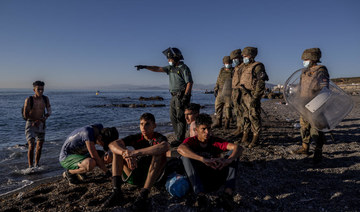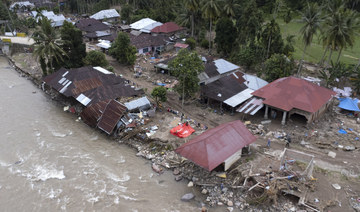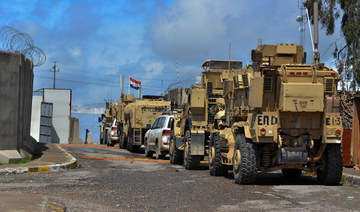COPENHAGEN: A former Danish immigration minister goes on trial on Thursday in a rarely used impeachment court accused of illegally separating couples who arrived in the country to claim asylum.
The 26 judges of the special court, which only convenes to try former or current members of government, will determine whether Inger Stojberg violated the European Convention on Human Rights.
Law professor Frederik Waage pointed out that it was only the third such case in more than a century, calling it “historic.”
Stojberg ordered the separation of 23 couples in 2016 where the woman was under 18 — though the age differences were mostly small — without examining the cases individually.
She is also accused of “lying to or misleading” parliamentary committees when informing them of her decision.
The 48-year-old ex-minister denies any wrongdoing.
Stojberg repeatedly made headlines in the international media for her handling of immigration issues during her 2015-2019 tenure as minister in the previous Liberal-led government.
She has since quit her party but remains a lawmaker.
Addressing parliament in February when lawmakers voted to try her, Stojberg said she did “the only political and humane thing” to combat forced child marriages.
“Imagine arriving in a country like Denmark, a country of equality, as a young girl victim of a forced marriage, and you discover that instead of giving you the possibility to break free of your forced marriage, the state forces you to stay together in an asylum reception center,” she said.
Of Denmark’s 179 members of parliament, 139 voted in favor of the impeachment trial. Thirty were opposed and 10 were absent.
As minister in a center-right government backed by the populist anti-immigration Danish People’s Party, Stojberg was responsible for Denmark’s ultra-restrictive immigration policy.
She boasted of having passed more than 110 amendments curbing immigrants’ rights, sparking controversy in 2017 when she posted a picture of herself on social media celebrating her 50th amendment cracking down on immigration.
During her mandate, she also passed a law allowing Denmark to confiscate migrants’ valuables to finance their stay in Denmark.
This is only the third time since 1910 that a member of government has been tried by the Court of Impeachment.
The last case dates back to 1993, when former justice minister Erik Ninn-Hansen was found guilty of illegally suspending family reunifications for Sri Lankan refugees in 1987 and 1988. He was handed a suspended four-month prison sentence.
If impeached, Stojberg will likely be ordered to pay a fine, said Waage of the University of Southern Denmark.
“In the case of Erik Ninn-Hansen, people probably died as a result of his decisions. In the case of Inger Stojberg, it’s not as serious,” he said.
He said he believed Stojberg’s actions may have violated the European convention, which stipulates that families must not be separated.
The Social Democratic government that took over in 2019 has not rolled back immigration restrictions — rather it has introduced some even tougher initiatives.
But Waage noted that the current government was keen to show that it does not violate the law.
The Court of Impeachment has scheduled 46 days of hearings.
Former Danish minister faces trial for separating migrant couples
https://arab.news/jhjj5
Former Danish minister faces trial for separating migrant couples

- It's the third time since 1910 that a member of government has been tried by the Court of Impeachment
At least five migrants died during attempt to cross English Channel - La Voix du Nord
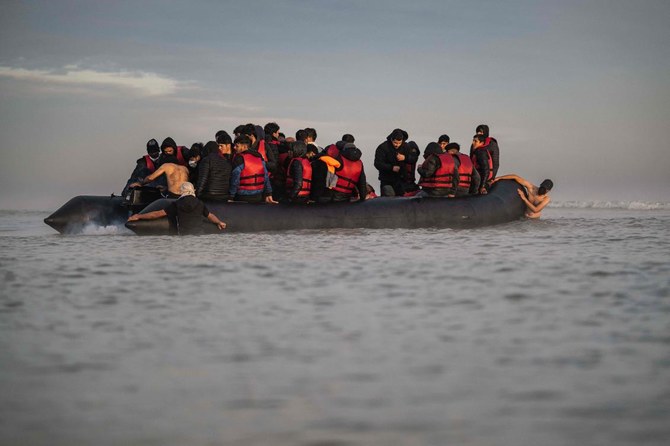
- People smugglers typically overload rickety dinghies, leaving them barely afloat and at risk of being lashed by the waves
The French coast guard confirmed there was a failed attempt to cross the Channel and said police were operating at a beach following the incident on Tuesday morning, adding there were several ‘lifeless bodies’.
Local police did not immediately reply to a Reuters request for comment.
The coast guard spokesperson said its agents were still operating at sea on Tuesday morning after what the official called a ‘busy’ morning, with several crossing attempts.
The Channel between France and Britain is one of the world’s busiest shipping lanes and currents are strong, making the crossing on small boats dangerous.
People smugglers typically overload rickety dinghies, leaving them barely afloat and at risk of being lashed by the waves as they try to reach British shores.
Asia hit hardest by climate, weather disasters in 2023— UN
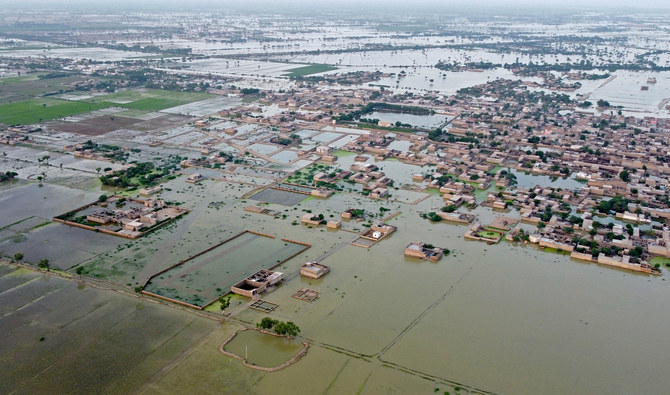
- Climate change exacerbated severity of weather disasters last year, sauys World Meteorological Organization
- 79 disasters, mostly floods and storms, associated with water-related weather hazards were reported in Asia in 2023
Geneva: Asia was the world’s most disaster-hit region from climate and weather hazards in 2023, the United Nations said Tuesday, with floods and storms the chief cause of casualties and economic losses.
Global temperatures hit record highs last year, and the UN’s weather and climate agency said Asia was warming at a particularly rapid pace.
The World Meteorological Organization said the impact of heatwaves in Asia was becoming more severe, with melting glaciers threatening the region’s future water security.
The WMO said Asia was warming faster than the global average, with temperatures last year nearly two degrees Celsius above the 1961 to 1990 average.
“The report’s conclusions are sobering,” WMO chief Celeste Saulo said in a statement.
“Many countries in the region experienced their hottest year on record in 2023, along with a barrage of extreme conditions, from droughts and heatwaves to floods and storms.
“Climate change exacerbated the frequency and severity of such events, profoundly impacting societies, economies, and, most importantly, human lives and the environment that we live in.”
The State of the Climate in Asia 2023 report highlighted the accelerating rate of key climate change indicators such as surface temperature, glacier retreat and sea level rise, saying they would have serious repercussions for societies, economies and ecosystems in the region.
“Asia remained the world’s most disaster-hit region from weather, climate and water-related hazards in 2023,” the WMO said.
The annual mean near-surface temperature over Asia in 2023 was the second highest on record, at 0.91 degrees Celsius above the 1991-2020 average, and 1.87 C above the 1961-1990 average.
Particularly high average temperatures were recorded from western Siberia to central Asia, and from eastern China to Japan, the report said, with Japan having its hottest summer on record.
As for precipitation, it was below normal in the Himalayas and in the Hindu Kush mountain range in Pakistan and Afghanistan.
Meanwhile southwest China suffered from a drought, with below-normal precipitation levels in nearly every month of the year.
The High-Mountain Asia region, centered on the Tibetan Plateau, contains the largest volume of ice outside of the polar regions.
Over the last several decades, most of these glaciers have been retreating, and at an accelerating rate, the WMO said, with 20 out of 22 monitored glaciers in the region showing continued mass loss last year.
The report said 2023 sea-surface temperatures in the northwest Pacific Ocean were the highest on record.
Last year, 79 disasters associated with water-related weather hazards were reported in Asia. Of those, more than 80 percent were floods and storms, with more than 2,000 deaths and nine million people directly affected.
“Floods were the leading cause of death in reported events in 2023 by a substantial margin,” the WMO said, noting the continuing high level of vulnerability of Asia to natural hazard events.
Hong Kong recorded 158.1 millimeters of rainfall in one hour on September 7 — the highest since records began in 1884, as a result of a typhoon.
The WMO said there was an urgent need for national weather services across the region to improve tailored information to officials working on reducing disaster risks.
“It is imperative that our actions and strategies mirror the urgency of these times,” said Saulo.
“Reducing greenhouse gas emissions and adapting to the evolving climate is not merely an option, but a fundamental necessity.”
UN officials urge UK to reconsider plan to transfer asylum seekers to Rwanda
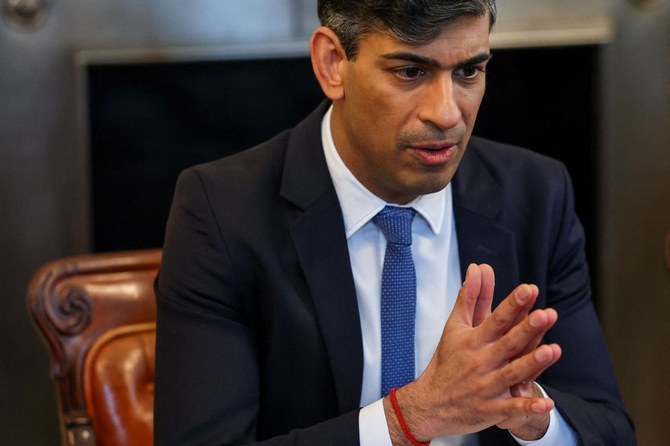
- UN called on the UK to instead take practical measures to address irregular flows of migrants and refugees
GENEVA: Two United Nations top officials on Tuesday called on the UK to reconsider its plan to transfer asylum seekers to Rwanda, warning the move would have a harmful impact on human rights and refugee protection.
In a joint statement, Filippo Grandi, the UN High Commissioner for Refugees, and Volker Turk, the UN High Commissioner for Human Rights, called on the UK to instead take practical measures to address irregular flows of migrants and refugees.
British Prime Minister Rishi Sunak promised on Monday to start sending asylum seekers to Rwanda within 10 to 12 weeks as the upper house of parliament passed legislation that had been delayed for weeks by attempts to alter the plan.
Asia hit hardest by climate, weather disasters in 2023:UN
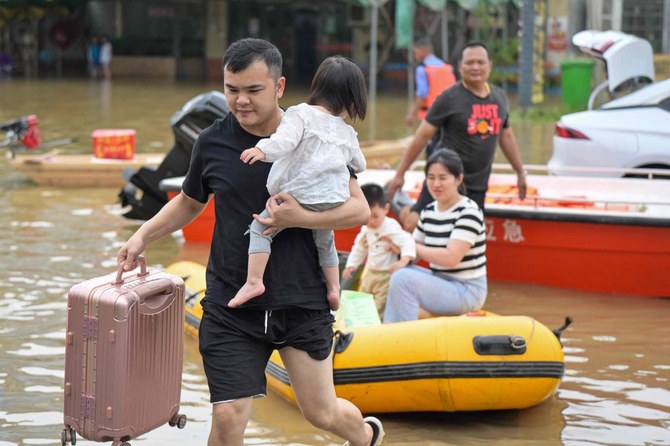
- UN’s weather and climate agency said Asia was warming at a particularly rapid pace
GENEVA: Asia was the world’s most disaster-hit region from climate and weather hazards in 2023, the United Nations said Tuesday, with floods and storms the chief cause of casualties and economic losses.
Global temperatures hit record highs last year, and the UN’s weather and climate agency said Asia was warming at a particularly rapid pace.
The World Meteorological Organization said the impact of heatwaves in Asia was becoming more severe, with melting glaciers threatening the region’s future water security.
The WMO said Asia was warming faster than the global average, with temperatures last year nearly two degrees Celsius above the 1961 to 1990 average.
“The report’s conclusions are sobering,” WMO chief Celeste Saulo said in a statement.
“Many countries in the region experienced their hottest year on record in 2023, along with a barrage of extreme conditions, from droughts and heatwaves to floods and storms.
“Climate change exacerbated the frequency and severity of such events, profoundly impacting societies, economies, and, most importantly, human lives and the environment that we live in.”
The State of the Climate in Asia 2023 report highlighted the accelerating rate of key climate change indicators such as surface temperature, glacier retreat and sea level rise, saying they would have serious repercussions for societies, economies and ecosystems in the region.
“Asia remained the world’s most disaster-hit region from weather, climate and water-related hazards in 2023,” the WMO said.
Ranging disasters
The annual mean near-surface temperature over Asia in 2023 was the second highest on record, at 0.91 degrees Celsius above the 1991-2020 average, and 1.87 C above the 1961-1990 average.
Particularly high average temperatures were recorded from western Siberia to central Asia, and from eastern China to Japan, the report said, with Japan having its hottest summer on record.
As for precipitation, it was below normal in the Himalayas and in the Hindu Kush mountain range in Pakistan and Afghanistan.
Meanwhile southwest China suffered from a drought, with below-normal precipitation levels in nearly every month of the year.
The High-Mountain Asia region, centered on the Tibetan Plateau, contains the largest volume of ice outside of the polar regions.
Over the last several decades, most of these glaciers have been retreating, and at an accelerating rate, the WMO said, with 20 out of 22 monitored glaciers in the region showing continued mass loss last year.
The report said 2023 sea-surface temperatures in the northwest Pacific Ocean were the highest on record.
Water-related hazards
Last year, 79 disasters associated with water-related weather hazards were reported in Asia. Of those, more than 80 percent were floods and storms, with more than 2,000 deaths and nine million people directly affected.
“Floods were the leading cause of death in reported events in 2023 by a substantial margin,” the WMO said, noting the continuing high level of vulnerability of Asia to natural hazard events.
Hong Kong recorded 158.1 millimeters of rainfall in one hour on September 7 — the highest since records began in 1884, as a result of a typhoon.
The WMO said there was an urgent need for national weather services across the region to improve tailored information to officials working on reducing disaster risks.
“It is imperative that our actions and strategies mirror the urgency of these times,” said Saulo.
“Reducing greenhouse gas emissions and adapting to the evolving climate is not merely an option, but a fundamental necessity.”
Jury deliberating in Iraq Abu Ghraib prison abuse civil case; contractor casts blame on Army

- Raisi said the killings by Israel in Gaza were being committed with the support of the United States and other Western countries
ALEXANDRIA, Virginia: A lawyer for the military contractor being sued by three survivors of the notorious Abu Ghraib prison in Iraq told jurors Monday that the plaintiffs are suing the wrong people.
“If you believe they were abused ... tell them to make their claim against the US government,” said John O’Connor, defense attorney for Reston, Virginia-based military contractor CACI, during closing arguments at the civil trial in federal court. “Why didn’t they sue the people who actively abused them?”
The lawsuit brought by the three former Abu Ghraib detainees marks the first time a US jury has weighed claims of abuse at the prison, which was the site of a worldwide scandal 20 years ago when photos became public showing US soldiers smiling as they inflicted abusive and humiliating treatment on detainees in the months after the US invasion and occupation of Iraq.
The suit alleges that civilian interrogators supplied by CACI to Abu Ghraib contributed to the torture the plaintiffs by conspiring with military police to “soften up” detainees for interrogations.
CACI, in its closing arguments, relied in part on a legal theory known as the “borrowed servant doctrine,” which states an employer can’t be liable for its employees’ conduct if another entity is controlling and directing those employees’ work.
In this case, CACI says the Army was directing and controlling its employees in their work as interrogators.
Lawyers for the plaintiffs disputed that CACI relinquished control of its interrogators to the Army. At trial, they introduced evidence that CACI’s contract with the Army required CACI to supervise its own employees. Jurors also saw a section of the Army Field Manual that pertains to contractors and states that “only contractors may supervise and give direction to their employees.
Muhammad Faridi, one of the plaintiffs’ lawyers, told jurors that the case is simpler than CACI’s lawyers are trying to make it.
He said that if CACI interrogators conspired with military police to inflict abuse on detainees to soften them up for interrogations, then the jury can find CACI liable even if CACI interrogators never themselves inflicted abuse on any of the three plaintiffs.
All three plaintiffs testified to horrible treatment including beatings, sexual assaults, being threatened with dogs and forced to wear women’s underwear, but said the abuse was either inflicted by soldiers, or by civilians who couldn’t be identified as CACI workers. In some cases, the detainees said they couldn’t see who was abusing them because they had bags over their heads.
As evidence of CACI’s complicity, jurors heard testimony from two retired generals who investigated the Abu Ghraib scandal in 2004; both concluded that CACI interrogators engaged in misconduct.
Faridi told the jury that while many of the soldiers who abused detainees were convicted and sentenced to prison, CACI has not yet been held accountable.
“When our country’s military found out about the abuse, they didn’t cover it up,” Faridi said. “Our country’s military held the military police members who were perpetrating the abuse accountable. CACI escaped liability.”
And Faridi said that even when the Army asked CACI to hold its its interrogators responsible, it still sought to evade responsibility. In May 2004, the Army asked CACI to fire one of its interrogators, Dan Johnson, after one of the Abu Ghraib photos showed Johnson interrogating a detainee who was forced into an awkward crouching position that investigators concluded was an illegal stress position.
CACI contested Johnson’s dismissal, writing that the “photo depicts what appears to be a relatively relaxed scene” and saying that “squatting is common and unremarkable among Iraqis.”
“I’ll leave that to you to consider whether you find that offensive,” Faridi told the jury Monday.
At trial, CACI employees testified they defended Johnson’s work because Army personnel had asked them through back channels to do so. O’Connor said that out of the many hundreds of photos of abuse at Abu Ghraib, the photo of Johnson is the only one depicting a CACI employee, and it shows him questioning not one of the plaintiffs but an Iraqi policeman after someone had smuggled a gun into the prison and shot at military police.
O’Connor also apologized for parts of his case that were “long, annoying and boring” but said he had no choice because the US government claimed that some evidence, including the identities of interrogators, was classified. So jurors, rather than hearing live testimony, were subjected to long audio recordings in which the interrogators’ voices were doctored and their answers were often interrupted by government lawyers who instructed them to not answer the question.
The trial was delayed by more than 15 years of legal wrangling and questions over whether CACI could be sued. Some of the debate focused on the question of immunity — there had long been an assumption that the US government would hold sovereign immunity from a civil suit, and CACI argued that, as a government contractor, it would enjoy derivative immunity.
But US District Judge Leonie Brinkema, in a first-of-its-kind ruling, determined that the US government cannot claim immunity in cases involving fundamental violations of international norms, such as torture allegations. And, as a result, CACI could not claim any kind of derivative immunity, either.
The eight-person jury deliberated about three hours before pausing Monday afternoon without reaching a verdict. Deliberations are set to resume Wednesday.



